Introduction
to Greek Mythology
Unit
Overview
In this unit on Greek mythology, you will gain
the skills to identify and articulate the characteristics, powers, and
significance of the major Greek gods, goddesses, heroes, and monsters within
the mythological hierarchy. You will also learn to critically analyze and
interpret the central themes and narratives of fundamental Greek myths, delving
into the allegorical content and the ethical lessons they impart, thus
fostering a deeper understanding of the ancient stories that have shaped
literary traditions.
Mythology's Journey: Past to Present
Welcome to our unit
on the rich tapestry of Greek mythology. Throughout this course, we will
explore a wide-ranging collection of classical works that have captivated
audiences for centuries. From the majestic narratives of the Olympian gods to
the epic sagas of the Trojan War and the poignant verses of Homer's Iliad, we
will journey through stories that have stood the test of time. These
narratives, originally passed down through the ages by word of mouth, were
eventually recorded in written form, allowing them to spread and be embraced by
different cultures around the world.

"An Ancient Greek Gathering at Night Around a Fire." *ChatGPT with DALL·E*, OpenAI, [3.9.2024].
Understanding the
impact of these tales is crucial. They offer more than just a window into
ancient history and culture; they form a foundational pillar of our educational
systems. The establishment of the earliest universities was driven by a
profound respect for these classical works, underscoring their significance in
shaping intellectual thought and inquiry.
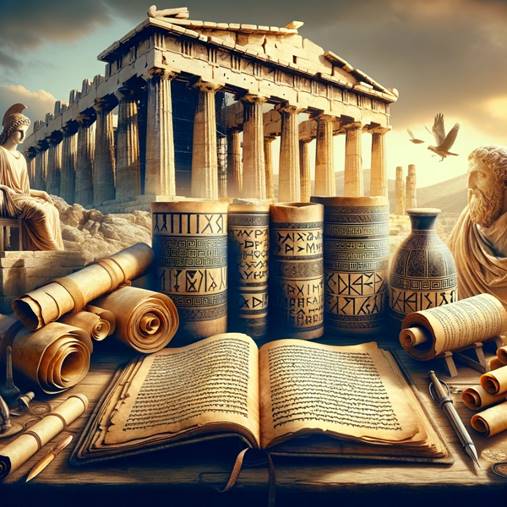
"A Variety of Ancient Greek Texts and Scrolls." *ChatGPT with DALL·E*, OpenAI, [3.9.2024].
As we delve into
these ancient stories, we will see how they continue to resonate with us today,
influencing contemporary culture, art, and literature. The legacy of Greek
mythology is not just a relic of the past but a living, breathing inspiration
that continues to inform and shape our world. Join us as we uncover the
enduring power and presence of these timeless narratives in our lives.
Introducing
Greek Mythology
For centuries, educational institutions have
been established to delve into the minds of history's greatest philosophers and
thinkers. Mythology, a term denoting
a collection of tales tied to a specific culture, serves as a window to the
past, particularly through the lens of Greek mythology. This course aims to
explore the rich tapestry of myths from ancient Greece, shedding light on the
daily lives and operational frameworks of ancient civilizations. It introduces
students to the underlying motivations of Greek mythology and the eminent
authors who have chronicled these tales.
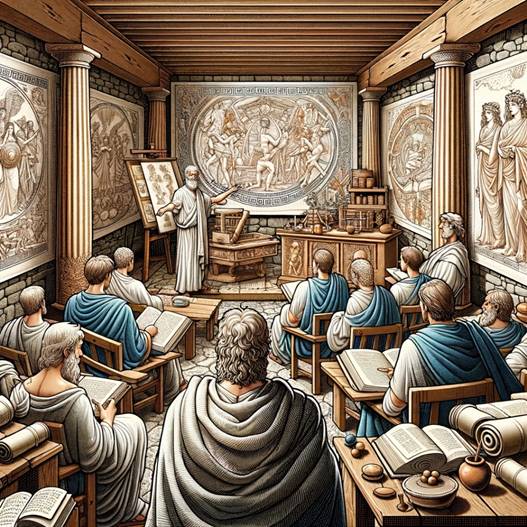
"An Ancient
Greek Classroom or Symposium." *ChatGPT with
DALL·E*, OpenAI, [3.9.2024].
It's crucial to recognize that the distinction
between reality and fantasy was often blurred in the creation of these myths. Thus, the characters we will
explore possess extraordinary abilities, accomplish feats beyond human reach,
and exhibit traits that surpass the ordinary. The Greeks were endowed with a
boundless imagination. Despite the era being marked by significant scientific
advancements, these discoveries were distinct and unlinked to the mythical
narratives we will examine.
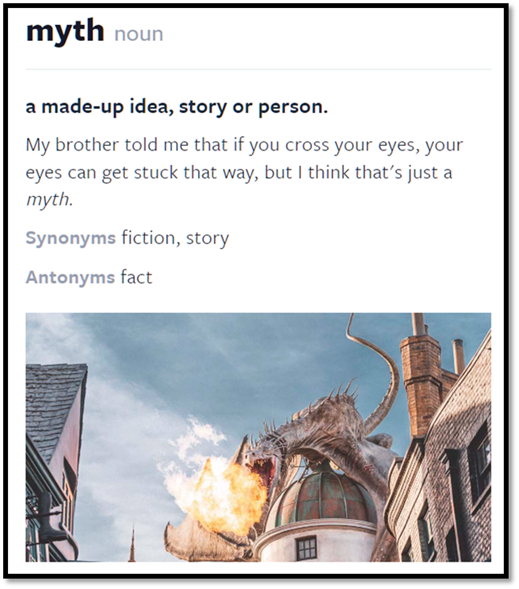
"Myth."
Flocabulary, Greek Mythology, https/www.flocabulary.com/unit/9-shoes-match-your-shirt/vocab-cards//.
(3.9.2024).
The Iliad
by Homer marks the earliest documented records of Greece, narrating the tale of the Trojan War, a central topic in this
course. Spanning over a decade, this war between the Greeks and Trojans
showcases Homer's reputation as a paramount historian and storyteller, living
around 900-700 BC. His works are pivotal in our understanding of Greek
mythology, encapsulating the essence of heroes, deities, and monumental historical
events.
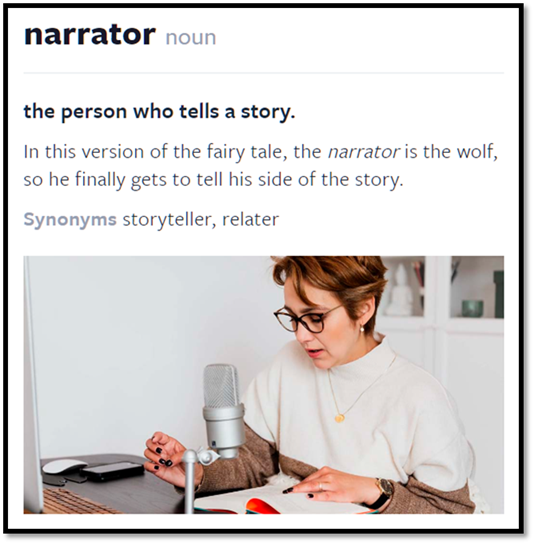
"Narrator."
Flocabulary, Greek Mythology,
https://www.flocabulary.com/unit/point-of-view/vocab-cards/. (3.9.2024).
The era that birthed Greek mythology was one of
transformation and enlightenment, often described as a renaissance within Greece. This period commenced with the
advent of Greek poets, signifying a radical shift in thought—humanity began to see itself as the
universe's focal point, ushering in a new era of innovative and future-oriented
thinking.
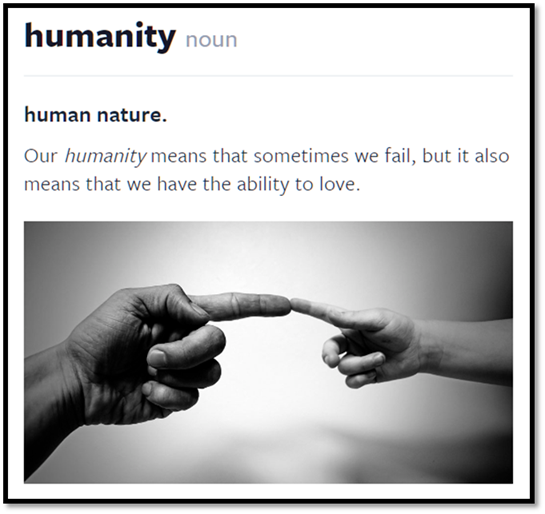
"Humanity."
Flocabulary, Greek Mythology,
https://www.flocabulary.com/unit/self-compassion/vocab-cards/. (3.9.2024).
Scholars sometimes refer to the "miracle
of Greek mythology," highlighting the anthropomorphic depiction of Greek gods, a contrast to the non-human forms
worshipped in other ancient cultures. This human-like portrayal made the divine
realm more relatable and less fearsome to the Greeks, fostering a culture where
gods, despite being revered, were seen as entities with human flaws and
emotions.
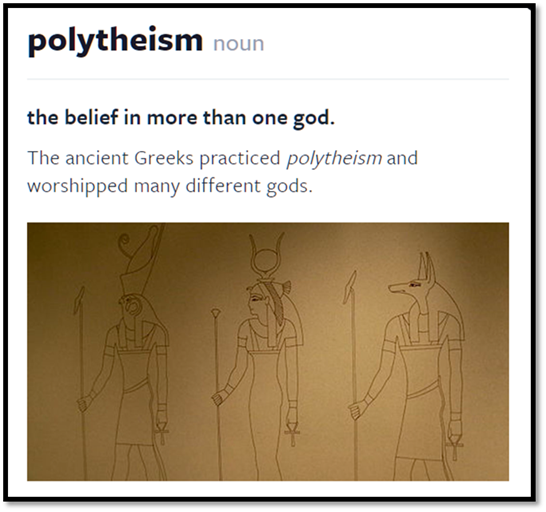
"Polyheism." Flocabulary,
Greek Mythology, https://www.flocabulary.com/unit/greek-mythology/vocab-cards/.
(3.9.2024).
However, remnants of older civilizations' deities, such as satyrs and centaurs,
embody the darker aspects of Greek mythology, standing in stark contrast to the
more humanized gods and goddesses. The presence of monsters is justified as
they are essential to any gripping narrative, providing adversaries for heroes
to overcome.
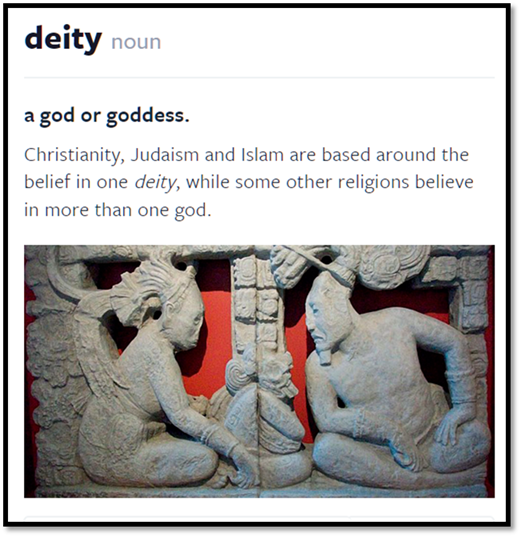
"Deity."
Flocabulary, Greek Mythology,
https://www.flocabulary.com/unit/greek-mythology/vocab-cards/. (3.9.2024).
It's important to note that Greek mythology should not be interpreted as
a religious scripture. These stories, while sometimes embedding religious
elements, primarily serve as allegorical explanations for natural phenomena and
the mysteries of the universe—early humans' attempts to comprehend their
surroundings. For instance, natural events like thunderstorms and volcanic
eruptions are attributed to the actions of gods, symbolizing humanity's initial
efforts to rationalize the natural world.
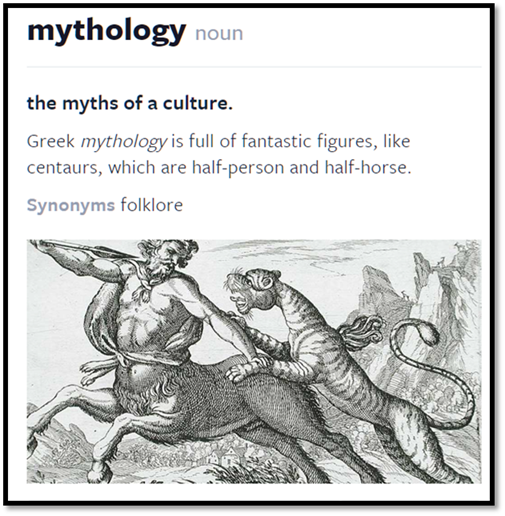
"Mythology."
Flocabulary, Greek Mythology,
https://www.flocabulary.com/unit/greek-mythology/vocab-cards/. (3.9.2024).
Some myths, such as the Quest of the Golden Fleece, are primarily crafted for
entertainment, representing the nascent stages of literature. These tales are
not just early science but also form the foundation of storytelling and the
exploration of human curiosity and imagination.
Greek Mythologists and Poets
The study of
classical mythology owes much to the works of Ovid, a prominent figure during
the reign of Augustus. Often regarded as a condensed repository of mythological
stories, Ovid's narratives stand out for their meticulous detail and expansive
storytelling.
Homer, renowned for
penning the Iliad and the Odyssey, is a cornerstone of Greek
literary heritage. His epic poems narrate the extensive journeys and trials of
a hero, encapsulating some of the earliest pieces of Greek literature. While
the precise dates of these works are debated, the Iliad is frequently ascribed
to around 1000 BC.
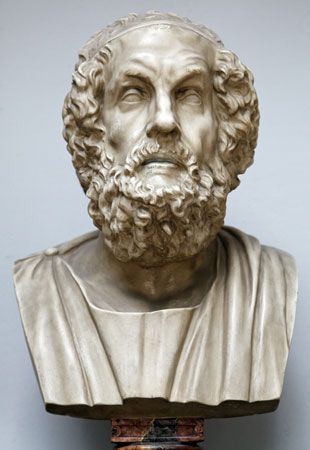
Homer, bust by an unknown
artist.
© Bruno Bernier/Fotolia
Hesiod, once a humble
farmer faced with adversity, turned to poetry to outline a pathway for a
fulfilling life amidst the trials of existence. His seminal work, Works and
Days, provides insights into achieving harmony with the natural and social
order.
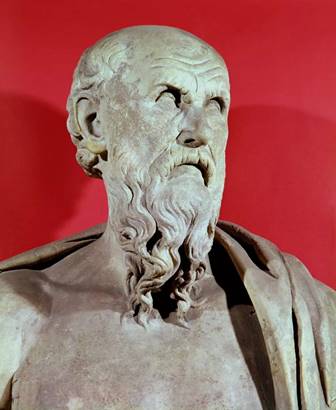
Greek, Getty Images. 3.9.2024.
Pindar is celebrated as
ancient Greece's preeminent lyric poet, known for his emotional depth and
musicality in poetry. His odes, dedicated to the victors of Greece's athletic
and cultural festivals, capture the spirit of celebration and achievement.
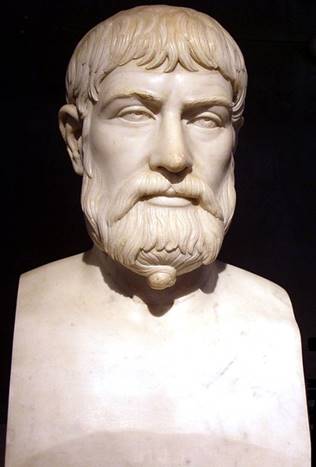
Pindar, by Stas Kozlovsky
published on 05 January 2022
Aeschylus, the pioneer
among the trio of Greek tragedians, introduced narratives with profound themes
through his tragedies. His play Persians commemorates the Greek triumph
over the Persians at Salamis. Following Aeschylus, Sophocles and Euripides
further enriched Greek tragedy, exploring complex characters and moral
dilemmas.
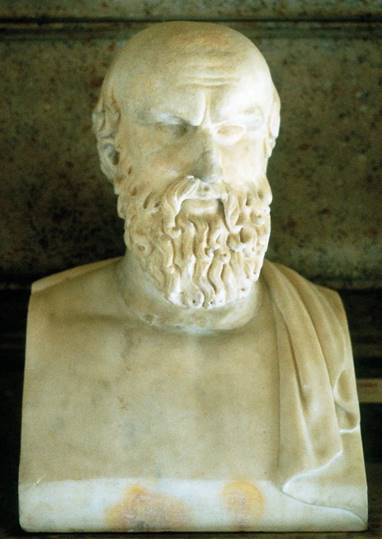
Aeschylus, marble bust.
Photos.com/Thinkstock
Aristophanes, celebrated
for his comedic genius, offered a unique blend of satire and humor, critiquing
contemporary Athenian society and politics through his plays. Together, these
authors have left an indelible mark on the world of mythology and literature,
their works serving as foundational texts for the study and appreciation of
ancient Greek culture.
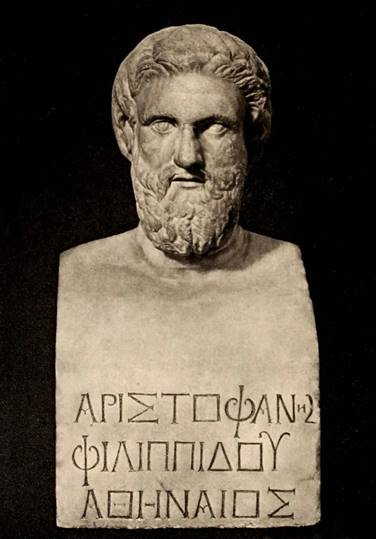
Aristophanes, portrait bust, c. 4th–1st
century BCE; in the collection of the Uffizi Gallery, Florence, Italy.
From Greek Dramas by Aeschylus, Sophocles, Euripides, and Aristophanes,
D. Appleton and Company, New York, 1900
Exploring Literary Forms
In this course, we
will delve into various literary forms, building on the foundational knowledge
you possess. While poetry, characterized by its verse structure, rhyme, and
meter, is a familiar concept, our exploration will extend beyond to include
both poetic forms and broader literary genres.
Literary Forms
Ode
An ode is a form of poetry dedicated to extolling a person, entity, or concept. Characterized by its lofty style, an ode seeks to celebrate its subject with admiration and respect, often employing an elevated language to do so.
Epic
Epic poems are expansive narratives that chronicle the formidable journeys and exploits of heroic figures. These tales are notable for their extensive vocabulary and detailed depiction of events and characters, stretching across vast settings that can span countries, worlds, or even the cosmos.
Lyric
Lyric poetry is akin to a song in its rhythm and rhyme, capturing intense personal feelings and reflections. While generally concise, lyric poems are expressive and can encompass various forms, including elegies, odes, and sonnets, each sharing the characteristic of conveying deep emotional experiences.
Comedy
In literature, comedies are narratives that steer towards a joyful conclusion, weaving humor throughout the story. While the protagonist typically finds a happy resolution, it's not always the case for every character, allowing for a range of outcomes within the comedic framework.
Tragedy
Tragedy presents narratives steeped in seriousness, where the central character faces significant adversity, often stemming from personal flaws or inescapable fate. These stories portray the protagonist's noble struggle against such trials, offering insights into human resilience and dignity amidst sorrow.
History
Historical narratives provide accounts of past events and cultures, aiming for an objective presentation of facts. However, it's not uncommon for these stories to carry the author's cultural perspective, occasionally revealing a biased lens.
Through these
literary forms, we will explore the breadth and depth of human expression, from
the individual's inner world to the epic narratives that have shaped
civilizations.
Crafting a Five
Paragraph Essay: A Comprehensive Guide
Throughout this
course, one of the key assignments you will undertake is writing a
five-paragraph essay. This section is dedicated to unpacking the essentials of
an effective five paragraph essay, including a deep dive into a sample essay,
and culminating in the creation of your own essay tied to the course's themes.
Before embarking on this writing journey, the initial step involves
brainstorming for ideas.
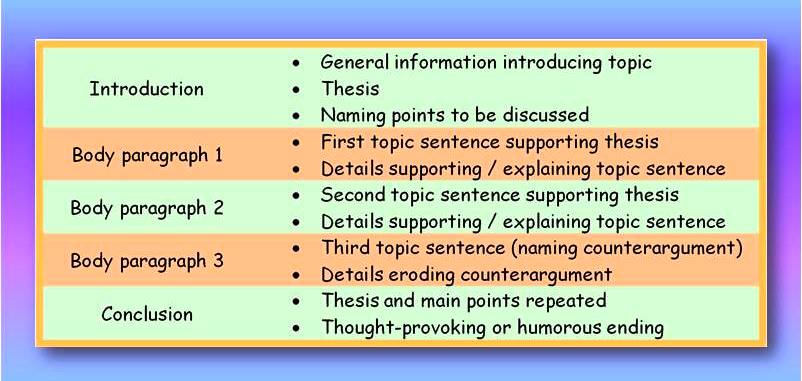
Gathering Information
Begin by collecting
information. Included in this unit is a chart titled "Gathering Information Tasks,"
which outlines six strategies for information collection and organization. When
preparing to write, employ any combination of these strategies to structure
your ideas and uncover relevant information on your topic. For instance, if
brainstorming for the prompt, compile details from this unit's text along with
your personal insights, without concern for spelling or grammatical
errors—simply jot down all thoughts that emerge.
Gathering Information Tasks
A technique in which you come up with as many ideas as possible on a subject.
A technique in which you break down a subject into smaller parts – Place the subject in the middle and circle it. Write related ideas around the subject, circling them and drawing lines to the subject.
A technique in which these questions are used to gather information: Who? What? When? Where? Why? How?
A technique in which the writer relies on the five senses – sight, touch, smell, hearing, tasting.
A technique in which the writer examines the experiences of others by asking questions, watching, interviewing, etc.
A technique in which the writer uses his imagination to generate ideas.
Sample Essay Examination
Now, let's examine
the contents of our example essay.
|
1
Over the last decade, the way we listen to music has undergone a seismic
shift, primarily due to the emergence of streaming services. This shift from
owning tangible CDs or downloading digital tracks to streaming music from
extensive online libraries represents a monumental change in our interaction
with music. Spotify, standing at the forefront of this streaming revolution,
has fundamentally altered our music consumption habits, offering a sprawling
selection of songs, personalized playlists based on our listening
preferences, and unmatched accessibility across various devices, making music
more integrated into our daily lives than ever before. 2 The era of bulky Walkmans, portable
CD players, and even the need to possess an iPod loaded with individual purchases
is now a relic of the past. Spotify has democratized music access, placing
millions of songs at our fingertips and eliminating the necessity for
physical storage. This platform's sophisticated algorithms that tailor music
recommendations to individual tastes have introduced a new level of
personalization and musical discovery, far surpassing the capabilities of
previous music listening devices and methods. 3
Beyond merely serving as a conduit for music, Spotify offers an array of
features that enhance the user's auditory experience. It allows for the
creation and sharing of personal playlists, provides access to a diverse
range of podcasts and audiobooks, and curates music suited to various moods
and activities. Furthermore, Spotify's deep integration with social media
platforms ushers in a digital communal listening space, enabling users to
share their favorite tunes or playlists with friends and followers, thereby
reimagining the act of communal listening for the digital age. 4
Spotify continues to push the boundaries of technology and user experience,
regularly rolling out updates and new features. High-definition audio options
cater to the discerning ears of audiophiles, while offline listening
capabilities for premium subscribers ensure that music is always accessible,
even without an internet connection. The platform's seamless compatibility
with a vast array of smart devices, from smartphones to smart speakers,
underscores Spotify's role as a pioneer in the digital music sphere,
constantly enhancing the way music integrates into our everyday lives. 5 In conclusion, while the iPod
revolutionized music listening by introducing portability and
personalization, Spotify has propelled this evolution forward, transforming
music from a commodity to be owned into an experience to be accessed and
shared. By making personal music listening more accessible, customizable, and
communal, Spotify has not only led the charge in the digital music revolution
but also continues to redefine the future of music consumption, promising
ongoing innovation and adaptation to the ever-evolving digital landscape. |
Structuring a Five Paragraph Essay
Introduction and Thesis Statement (Paragraph 1)
The introduction sets
the stage for your essay. It should begin with a compelling sentence to
captivate the reader's interest, introducing the main idea that will be
explored throughout the piece. The thesis statement, typically positioned at
the end of the introduction, succinctly outlines the essay's central argument
and the principal points that will be discussed. For instance, an essay on the
significant shift in how we listen to music over the last decade might start
with an observation on this transformative period, particularly emphasizing the
role of streaming services like Spotify. The thesis should articulate the core
idea—that is, how Spotify and similar platforms have revolutionized personal
music listening through unparalleled accessibility, deep personalization, and
the facilitation of communal experiences.
By focusing on these
key elements, the introduction not only grabs the reader's attention but also
provides a clear roadmap of the essay's direction, setting the tone for an
insightful exploration of Spotify's impact on the music consumption landscape.
Body Paragraphs: Overview of Content
·
Paragraph 2: This paragraph will address the unmatched accessibility that Spotify
offers, as mentioned in the thesis statement. Unlike the constraints of
physical media or the limited storage of digital downloads, Spotify has
revolutionized music consumption by providing instant access to an extensive
online library. The focus will be on how Spotify's platform has eliminated the
need for physical storage and allows users to explore millions of songs across
different devices, making music more integrated into our daily routines than
ever before.
·
Paragraph 3: Continuing with the thesis, this section will explore the
personalization aspect of Spotify. It will discuss how Spotify uses
sophisticated algorithms to tailor music recommendations to individual tastes,
allowing for a highly personalized listening experience. This includes the
creation and sharing of personal playlists, as well as Spotify's ability to
curate music for various moods and activities, significantly enhancing the way
users interact with music and discover new songs and artists.
·
Paragraph 4: The final body paragraph will examine Spotify's contributions to
creating a communal listening experience. This will cover Spotify's deep
integration with social media platforms, enabling users to share their music
discoveries and playlists with friends and followers. The discussion will also
highlight Spotify's features like collaborative playlists and access to
podcasts and audiobooks, which further enrich the user's auditory experience
and foster a sense of community among listeners.
Conclusion
(Paragraph 5)
The concluding
paragraph revisits the thesis statement, summarizing the key points made
throughout the essay and the overall significance of Spotify in revolutionizing
personal music listening. By transcending the limitations of physical and
downloaded music, Spotify has ushered in an era of unparalleled accessibility,
deeply personalized experiences, and a reimagined sense of community among
listeners. It wraps up the discussion by reinforcing Spotify's transformative
impact, highlighting how it has not just followed in the footsteps of previous
innovations but has also set a new benchmark for how music can be experienced
and shared in the digital age. Spotify's enduring legacy, therefore, lies in
its ability to continuously innovate and adapt, promising a future where music
remains an integral, ever-evolving part of our daily lives.
By clearly stating
what each paragraph will cover, students can organize their thoughts more
effectively and understand the structured flow of a five-paragraph essay, from
introduction through body paragraphs to conclusion.
Self-Evaluation and Revision
Don't overlook the
importance of self-evaluation and revision. Review your essay for grammatical
accuracy, coherence, and alignment with the rubric's criteria, aiming for the
highest quality.
|
Score |
Explanation |
Criteria |
|
4 - Excellent |
The
writing excels in explaining the topic with logic and completeness. |
·
Logically and completely explains the topic ·
Effective use of ideas, details, and examples ·
Appropriate and varied vocabulary ·
Varied sentence structures ·
Correct use of grammar, punctuation, capitalization, and
spelling |
|
3 - Good |
The
essay discusses the topic adequately, though it may lack in consistent logic
and completeness. |
·
Discusses the topic with minor lapses in logic and
completeness ·
Adequate vocabulary ·
Some errors in sentence structure ·
Occasional punctuation, capitalization, and spelling errors |
|
2 - Fair |
The
essay addresses the topic but includes unrelated or unnecessary information,
affecting its completeness. |
·
Addresses the topic but includes irrelevant information ·
Lacks completeness ·
Acceptable but
monotonous vocabulary ·
Noticeable grammar errors ·
Frequent punctuation
and spelling errors |
|
1 - Poor |
The
writing provides a vague reference to the topic without adequate development,
suffering from scarce supporting details. |
·
Hints at the topic without development ·
Scarce or irrelevant supporting details and examples ·
Often inappropriate vocabulary ·
Numerous grammar, capitalization,
punctuation, and spelling errors |
|
0 - Inadequate |
The
essay demonstrates a total disregard for the topic and assignment
requirements. |
· Total disregard for
the topic and requirements |
Final Steps: Proofreading and Final Draft
Submission:
After receiving
feedback from your teacher, make necessary adjustments. Your final draft, now
refined and polished, is ready for submission.
| Research Paper Revision Questions | YES | NO |
|---|---|---|
| Is the introduction interesting? | ||
| Does the introduction explain what the paper is about? | ||
| Did you avoid using words like 'I' and 'me' in your introduction? | ||
| Did you stick to your topic? | ||
| Is the body of your paper organized in a logical order? | ||
| Did you correct run-on and fragment sentences? | ||
| Are all the ideas clearly explained? | ||
| Have you limited each paragraph to just one main idea? | ||
| Did you write many different kinds of sentences? | ||
| Did you use descriptive words throughout your paper? | ||
| Have you combined short, choppy sentences into longer, more mature-sounding sentences? | ||
| Does the conclusion summarize the important information from my paper? | ||
| Have you taken out information that you don’t need? |
